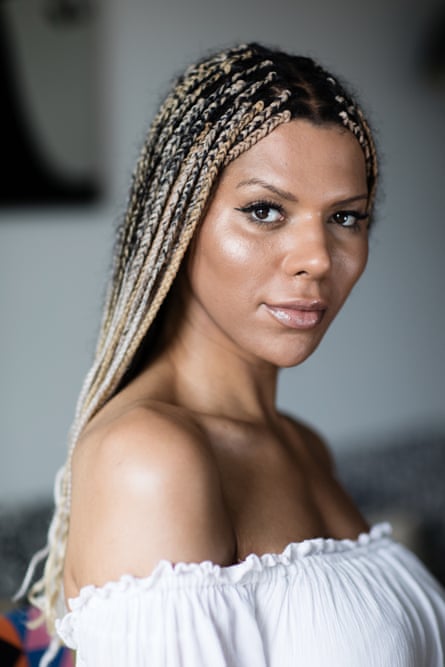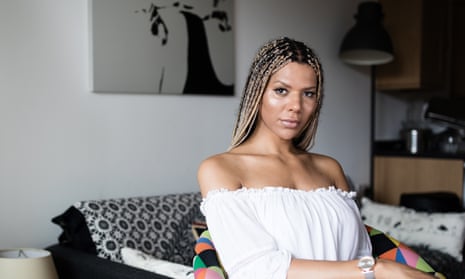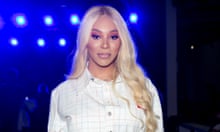By 8.12pm on Sunday, Munroe Bergdorf is done in. It is a week since she was announced by L’Oréal as the face of True Match, a campaign that marries makeup to social justice, and three days since she was sacked unceremoniously. A BBC 2 producer is on the phone, talking to her about an interview with Victoria Derbyshire the next morning. “It has been the worst week of my life,” she tells him, trying to deflate the tension with a laugh. Prompted to explain why it has been so bad, she reels off “the death threats, threats of rape, threats of assault, people telling me to kill myself, the general bombardment and fear that something else will happen”. She pauses, then sighs. She hasn’t left her flat in days. “The most ridiculous thing is that you call out racism and they respond with more racism. It just doesn’t make any sense.”
Bergdorf, a 30-year-old, black, queer, trans woman who models and DJs, is no stranger to abuse and ridicule. Her very existence is subversive and threatening enough to the mainstream that a trickle of racist, homophobic and transphobic bile has become par for the course in her daily life on and offline – but now it has become a torrent.
As the Daily Mail reported it on Friday, “with a dizzying fanfare, she was brought in as the ‘face of modern diversity’. But days after she was announced as L’Oréal’s first transgender model, Munroe Bergdorf launched an extraordinary rant declaring all white people racist”. The story went viral, reported everywhere from Al-Jazeera to the New York Times.
“I’m trying to think of the best ways to get across what I actually said,” she tells me, over a picnic of French fries and apple Tango at her kitchen table.

She explains that, the morning after the rally in Charlottesville, Virginia, where an anti-racist protester was killed by a white supremacist, she wrote a Facebook post in response to that event. “It was an epic three-parter about how racism is a social structure and how, if this is the case, what can you do to combat racism?” She says the post was deleted by Facebook for breaching its terms on hate speech; the racist, transphobic comments made about Bergdorf, however, were left up. (A Facebook representative said: “We haven’t yet got to the bottom of what happened to Munroe’s post”, but “we are looking into it.”) The post was then filleted for its most incendiary lines: “Most of ya’ll don’t even realise or refuse to acknowledge that your existence, privilege and success as a race is built on the backs, blood and death of people of colour,” she wrote. “Your entire existence is drenched in racism. From micro-aggressions to terrorism, you built the blueprint for this shit. Come see me when you realise racism isn’t learned, it’s inherited and consciously or unconsciously passed down through privilege. Once white people begin to admit their race is the most violent and oppressive force of nature on Earth … then we can talk.”
Unsurprisingly, Bergdorf made some people uncomfortable, made some people cheer and pissed off many others, including her mother, who is white and reads the Daily Mail. “That was an awful conversation. I’m half-white. My mum thought I was lumping her in with everyone, but this isn’t about individuals. To understand my point, you have to take yourself out of the conversation – it’s not about you – and truly think about society, structurally, economically, as a whole.”
But isn’t that the trouble? Lots of people won’t and don’t understand. Not everyone reads Frantz Fanon and Patricia Hill Collins for kicks – academic theory will only go so far in convincing the average person on an average street that institutionalised, systemic racism is just as damaging as a violent, racist attack.
“I don’t regret what I said,” she says, calmly. “I’m an activist. Being an activist means calling people out, not just saying what everyone else is saying and what everyone else wants to think and upholding the common consensus. L’Oréal knew that when they hired me.”

This isn’t provocation for provocation’s sake; Bergdorf knows there is no time to pussyfoot until everyone else catches up.
“I can wholeheartedly say that the dictionary definition of racism was written a very long time ago and not by a person of colour. It doesn’t allow us to have a conversation about modern-day racism. If you’re not aware of it, then make yourself aware of it. Racism isn’t just calling someone something, it’s a whole system. If you think we live in an equal society, you’re living in a daydream. You need to recognise that there is such a thing as white privilege and you can be homeless and still have white privilege, because you can still have a better chance of getting out of homelessness than a person of colour in the same position.”
Isn’t the problem that the language is outmoded? It’s hard to get people on board when “racist” is a loaded catch-all umbrella to describe everything from unconscious biases in the workplace to US neo-Nazis.
“We do have the language,” she says, “but it needs to be out there: unlearning, microaggressions, being complicit, unconscious bias, privilege – these need to be taught, we need to address why syllabuses only teach white history, we need to speak about slavery and the brutality of colonialism.”
Bergdorf’s speaking voice is an even-handed murmur; she pauses occasionally, apologising for what feel like rocks in her throat. Someone she knew from university, she says, sold the story to the Daily Mail and bragged about it.
She deliberately hasn’t seen friends or family since the story broke because “I need to deal with it without being told constantly ‘It’s going to be OK’, when who knows if it will be.” Her flatmate has been around and friends have rallied, but, for the most part, she has been managing alone, without an agent or a PR. She has four upcoming campaigns this year; three of her clients have yet to call her to confirm that is still the case. It is irrelevant, she says, because her principles will always come first.
“My body has always been political – the way people respond to my body has always been political, whether or not it was about gender or race,” she says. “I grew up in a white-majority area on the borders of Hertfordshire and Essex ... but I’m mindful of my parents and giving too much away; they’re really worried.” She had a solidly middle-class upbringing, with one younger brother who is “straight and super woke and the first person I called”. Her dad is Jamaican and her mum is white English. “Dad was tough on me growing up as a very effeminate boy, but we’re very close now. Mum is feisty and super successful, heading up PR for a financial company.”

Bergdorf was horribly bullied at her all-boys school and beaten up. She says the loneliness she felt through her teenage years was intense. “I lived in my own head and in make-believe. I was obsessed with Cyndi Lauper – I still am. She gave me a lot of strength: that quote ‘On my darkest days I wear my brightest clothes’ is still true for me.” We laugh – today she is wearing sombre, black tights and a grey marl top; understandably, she is not ready for dressing up. “The mornings have been the worst, as my anxiety has been super high and it’s difficult to get up.” She shows me pages of abusive social media screenshots. “I didn’t get out of bed till 1pm today.” Isn’t it a form of self-harm, to put herself through it? “No, I need to know what’s going on so I can feel in control. And I’m resilient: I worked hard at it.”
Bergdorf studied English at the University of Brighton. “I guess I was genderqueer, but there weren’t really the words to express my identity – I just started wearing makeup and heels.” A three-year career in fashion PR followed university before she “crashed and burned”. When she decided to transition at 24, she also learned how to DJ so “I could be myself, self-care and make money. Needing that time and space to yourself is why a lot of trans girls fall into sex work, because the process is expensive and the money is reliable”. She sighs. “Trans women of colour are being killed at an alarming rate.” When she was transitioning, she says the average life expectancy for a trans woman like her was 30. “At the time, I thought: ‘That’s only a few years. I should be speaking about this.’”
Bergdorf was raped during the period she was transitioning; she reported it to the police, but the attacker was never found. She took even more strongly to activism. “It wasn’t just standing up for rights that were my own,” she explains. “Islamophobia, antisemitism, anything I saw that I didn’t think was right, I would protest or post. I think that’s the stance everyone should take: if white people protested and worked to dismantle racism ... I would have loved to have seen the reaction around Brexit from liberals with racism. If people rallied around issues that don’t affect them as well ones that do, we’d be getting shit done.”
Bergdorf built an audience – and influence – within the LGBT community, partially through DJing. “It was the best investment. I was 25, got loads of gigs and it felt like it was what I was always meant to do. I had a lot of fun. I was a complete wild child and went off the rails and did all that rock star shit.”
Despite cabin fever, and stressful breaks to deal with her buzzing phone, Bergdorf is warm, smart and charming; on meeting her, you can understand how she has made the connections that have built her career. A shoot for a couture Lebanese Muslim collection was her first modelling gig; campaigns with Illamasqua and Boy London followed.
She was shopping on Thursday afternoon when L’Oréal called her about the story the Daily Mail said it was going to publish. “I kept explaining the context and the full post and they wouldn’t listen. They said not to go out and not to talk to anyone.” In a statement, L’Oréal said, without irony, that it “supports diversity and tolerance towards all people irrespective of their race, background, gender and religion … we are proud of the diversity of the ambassadors who represent this campaign. We believe that the recent comments by ... Munroe Bergdorf are at odds with those values and as such we have taken the decision to end the partnership with her.”
L’Oréal’s key ambassador, Cheryl Cole, was found guilty of assault for beating up a black nightclub toilet attendant, but evidently that doesn’t conflict with the company’s policies. (Cole was cleared of racially aggravated assault.) Clara Amfo, a Radio 1 DJ and a L’Oréal True Match ambassador, quit the campaign in solidarity with Bergdorf, partially in protest at the hypocrisy of the situation.
“It puzzles me that my views are considered out of touch and extreme,” says Bergdorf. But it is an argument from which she can’t run. “I said no three times to Good Morning Britain,” she says. “But then I thought: ‘This is what you’re meant to be doing and this is a conversation that needs to be had. A lot of people are relying on you.” On Monday morning, her conversation with Piers Morgan goes as we discussed it would the evening before: Morgan asks if he is racist, says he is offended at being considered racist or sexist and shuts down Bergdorf. “The split between support and hatred has been about 50/50,” she says later that day. “On the one hand, it’s amazing, but it is horrible and awful to think that people hate me.”






